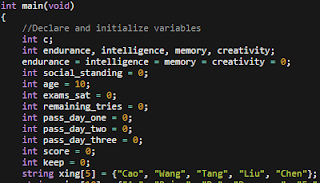Project Management for disorganised people
There’s a certain
kind of person (I have been lucky over the years to have worked with many very talented
examples) who has a very structured approach to starting a new project. They
might start with something like high level goals and proceed logically from
there to task decomposition, dependency analysis, and the application of a
whole host of internally
consistent, repeatable techniques for
considering the task from every possible angle to ensure there are no gaps. They
then refresh on a regular basis to see if everything is coming along as
planned.
My brain doesn’t
really work that way. My process usually starts with “Huh, wouldn’t it be cool
if..?”, assembling every scrap of information I can about whatever it is,
jotting down insights as they occur and then staring vacantly into space 90
minutes later when the flow state ends and I try to make some sense of it all. This
always leaves me feeling that there must be something that was missed, but after
15 or so years of seeing this play out in the workforce, I’ve come to the
conclusion that no, it really does end up in exactly the same place as if I’d forced
myself to start from first principles. The mind doesn’t really seem to
care whether we use System 1 or System 2 thinking to encode and retrieve
information, and once information has been assembled into a logical
sequence, it may not matter when using it later whether that sequence was
arrived at intuitively or in a series of top-down logical steps.
The strength
of the intuitive process is that it’s fast and good for making decisions
quickly. Where I think it suffers is in the follow-up; I find it actively
painful to look at a list of things and ask myself, line by line, “where are we
with this?” (this is why my wife project manages holidays).
All of
which is to say, I’ve got some unformed ideas on where to start, what I’ll need
and where the gaps are, but this isn’t going to be very pretty just yet.
What I
know
·
Common
features of games I’ve enjoyed (mostly RPGs, strategy games and the importance
of the random sadism of the failure elements in roguelikes and soulslikes)
·
UIs that I like and those that incite rage and property
damage
·
How
to properly budget an individual game (in terms of upfront costs, realistic
projections for indie dev sales-over-time and consequent ROI)
·
Legal
and accounting aspects of setting up a business
·
General
overview of IP law that’s a few years out of date and not all that helpful for
software specifically
·
30+
years of concepts for games I know I would enjoy if someone else made them,
with one very specific and simple concept I think will make a simple, fun
project
·
Everything
takes twice as long as you think it will, and then twice as long again
·
Not
terrible at math maybe?
What I
don’t know
·
Fundamentals
of computer science, data architecture and so on
·
Will
I find coding easy, hard or in-between?
·
How
much art will cost and where to source good artists
·
How
do you do all the fiddly bits – installer packages, sound and graphics driver
support, load-and-save mechanics
·
IP
considerations: details of how code is protected, implications for reusability
of code for learning via courses, textbooks and examples from GitHub. Intuitively,
basic stuff like how to make a save game, make a graphics driver work and code
a menu screen can’t be guild secrets but it will be helpful to know how this
actually works in detail fairly early on

Comments
Post a Comment